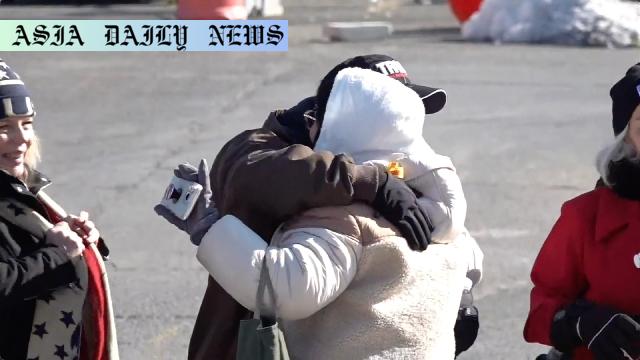Capitol rioters pardoned by Donald Trump, causing widespread backlash and renewed calls for justice.
Several Capitol rioters were freed after receiving pardons from former President Donald Trump.
Public outrage follows the release, as critics argue it undermines justice and accountability.
A survey shows 58% of Americans oppose the pardons, criticizing Trump for enabling undemocratic actions.

Introduction: The Controversial Pardons
The release of individuals convicted for their involvement in the January 6, 2021, attack on the US Capitol has sparked a wave of public and political outcry. Former President Donald Trump, on his first day back in office, issued pardons for more than 1,500 individuals either charged or convicted for their role in the violent event. Among them were several prisoners detained in a Washington, DC facility, who were released on Wednesday to a crowd of supporters and protesters.
The Scene Outside the Washington DC Facility
As the released individuals emerged, they were greeted by a throng of Trump supporters celebrating their release as a victory for “justice against a corrupt government.” One freed rioter, speaking anonymously, expressed gratitude toward Trump and reiterated views that likened their imprisonment to political persecution. In stark contrast, others were there to protest the pardons, including a woman holding a sign bearing the name of a police officer who lost his life during the Capitol riot. She condemned the act as “treason against our democracy” and criticized Trump’s decision, declaring it a betrayal of American values.
Public Reactions and Rising Discontent
The backlash has been swift and widespread. A Reuters-Ipsos survey revealed that nearly 58% of Americans disapproved of the mass pardons, with many voicing concerns that the actions undermine the rule of law and could embolden future acts of political violence. Activists and former officials have called for measures to uphold accountability and safeguard democratic principles in light of these pardons.
Political and Societal Ramifications
Trump’s decision to issue pardons to Capitol rioters has cast a looming shadow over the political landscape. Critics argue that granting clemency to individuals involved in one of the most severe breaches of national security in recent history sends a harmful message. For many, the move showcases Trump’s continued influence over a significant portion of the Republican base, while also reigniting fears about increasing polarization and diminishing faith in institutions. Legal experts have also raised questions about the precedent such pardons may set for future administrations.
Supporters’ Perspective
Alternatively, Trump’s supporters see the pardons as an act of loyalty and support for those they view as “patriots.” Many argue that the prisoners were unjustly vilified and imprisoned for political reasons. They champion Trump’s decision as a return to his campaign promise of prioritizing his base and challenging what they perceive as Washington’s “corruption and double standards.” This unwavering support underscores the persistent divide within the nation regarding the events of January 6th.
The Road Ahead
The pardons have underscored the urgent need for bipartisan efforts to address the deep rift within the country. As debates over accountability, justice, and democracy continue, lawmakers and citizens alike must grapple with the broader implications of these divisive pardons. The January 6 attack remains a stark reminder of the fragility of democratic institutions and the ongoing threats they face. What the future holds for unity and reconciliation—if any—remains uncertain.
The events surrounding the Capitol riots and their aftermath have become a defining chapter in recent American history. The release of these individuals not only reignites debates over justice but also serves as a critical moment to reflect on the nation’s values and the implications of political decisions that reverberate across society.
Commentary
Pardons and the Erosion of Accountability
The decision to pardon Capitol rioters raises troubling questions about the state of accountability in America’s democracy. By granting clemency to individuals who participated in the violent insurrection, former President Trump has set a concerning precedent, suggesting that actions aimed at undermining democratic processes can go unpunished. This undermines years of hard-fought efforts to promote justice and maintain law and order.
The Impact on American Democracy
Such decisions also have broader implications for the nation’s democratic fabric. The January 6 attack was a direct assault on the principles of democracy, and pardoning those involved could potentially embolden like-minded actors. This erosion of accountability risks creating a dangerous cycle where extremist activities become normalized and excused.
A Divided Nation
What’s equally concerning is the sharp divide in public opinion, illustrated by the celebrations of Trump’s supporters in juxtaposition with the outrage from many Americans. This divide not only reflects the polarization within the country but also highlights the challenges of fostering unity in such a charged political environment. Addressing these divides is crucial for preventing future conflicts and restoring faith in governance.
In conclusion, while the pardons may have satisfied a specific political base, their long-term implications for justice, democracy, and national unity remain deeply unsettling. The country must strive to rebuild its institutions and address these critical issues before further damage occurs.


